高中英语系动词和助动词精讲及练习
助动词用法及练习
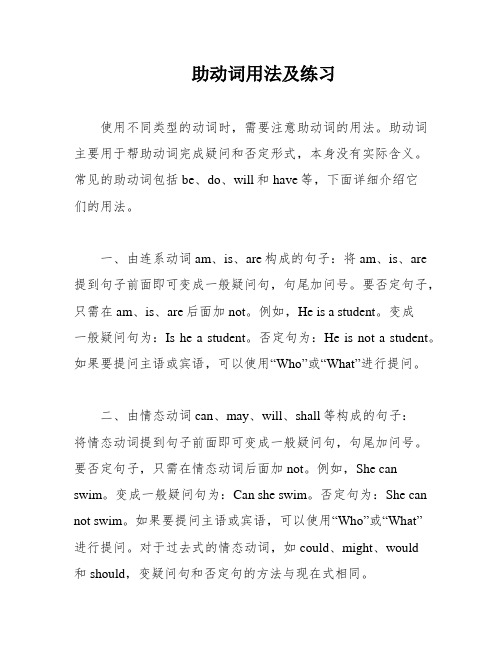
助动词用法及练习使用不同类型的动词时,需要注意助动词的用法。
助动词主要用于帮助动词完成疑问和否定形式,本身没有实际含义。
常见的助动词包括be、do、will和have等,下面详细介绍它们的用法。
一、由连系动词am、is、are构成的句子:将am、is、are 提到句子前面即可变成一般疑问句,句尾加问号。
要否定句子,只需在am、is、are后面加not。
例如,He is a student。
变成一般疑问句为:Is he a student。
否定句为:He is not a student。
如果要提问主语或宾语,可以使用“Who”或“What”进行提问。
二、由情态动词can、may、will、shall等构成的句子:将情态动词提到句子前面即可变成一般疑问句,句尾加问号。
要否定句子,只需在情态动词后面加not。
例如,She can swim。
变成一般疑问句为:Can she swim。
否定句为:She can not swim。
如果要提问主语或宾语,可以使用“Who”或“What”进行提问。
对于过去式的情态动词,如could、might、would和should,变疑问句和否定句的方法与现在式相同。
三、由行为动词构成的句子:需要使用助词do或does。
将do/does放在句子前面即可变成一般疑问句,句尾加问号。
要否定句子,只需在动词前面加don’t/doesn’t。
需要注意动词的形式,一般疑问句和否定句的动词三单式都要变回原型。
例如,play变成do,plays变成does。
They play football after school。
He also plays XXX.Do they play football after school。
Does he play football after school?XXX.Who plays football after school。
What do they do after school。
2025届高考英语语法复习-动词的分类知识讲解 讲义

高考英语语法复习动词的分类知识讲解cry 哭泣disappear 消失go 走,趋于live 生存,居住rise 上升,增强shiver 颤抖,哆嗦sparkle 闪耀appear 出现decay 衰退exist 存在happen 发生occur 发生,出现roar 咆哮,喧闹sigh 叹息swim 游泳arise 出现,产生deteriorate 恶化fall 落下hesitate 犹豫scream 尖叫sit 坐,位于travel 旅行collapse 倒塌die 死亡flow 流动laugh 笑quiver 颤抖smile 微笑sneeze 打喷嚏lie 躺,位于,说谎age (使)成熟,变老break 打破(记录)close 关闭,结束decrease 减少,减小end 结束,终止grow 种植,生长meet 满足,对付;相遇shake 动摇,发抖spread 散布,铺开,传播stop 断绝,停止widen 加宽,变宽begin (使)开始burn 烧毁,燃烧continue (使)继续double (使)加倍finish 完成,终结improve 改善,加强open 打开,开始show 演示,说明;显示stand 忍受,抵抗;站立tear 撕毁,流泪stretch (使)伸展;使用,消耗boil (使)蒸发,沸腾change (使)改变cook 烹饪,做菜dry 弄干,变干fly 使飘扬,飞行increase 增加run 经营,运转slow 放慢,阻碍,变慢start 启动,出发turn 使旋转,转动。
高中英语动词分类精华讲解

动词的分类动词种类实义动词连系动词助动词情态动词(重点)及物动词不及物动词状态系动词持续系动词表像系动词感官系动词变化系动词终止系动词Be DoShall WillhaveCan MayMust Have toShall WillNeed dare动词形式动词原形过去式过去分词现在分词一般时过去时完成时、被动语态进行时、动词词一、动词的分类按照动词在句中的作用,英语动词可分为四类;实义动词,连系动词,助动词和情态动词。
1、实义动词(行为动词)实义动词(行为动词)说明动作或状态,能独立作谓语,可分为及物动词和不及物动词。
(1)及物动词及物动词必须接宾语,才能有完整的意思,这可以有三种情况;①动词+宾语Her father enjoys warm tea very much in summer.她的父亲夏天非常爱喝热茶。
②动词+间接宾语+直接宾语(直接宾语是谓语动词的承受者,间接宾语表示谓语动作的方向(对谁做)或动作的目标(为谁做),间接宾语紧接在谓语动词后,但它不能单独存在。
)Did he give you a present yesterday?May I ask you a question?③动词+宾语+宾补They call her "Little Li".他们叫她小李。
They elected Bush president.他们选布什当总统(2)不及物动词不及物动词本身有完整的意思其后不需要跟宾语。
例如:His mother works in a hospital.(介词短语做地点)She stayed at home yesterday.(介短)A. 记住下面这些可带双宾语的动词buy, bring, build, cook, cut, draw, find, hand, get, leave, lend,make, offer pay, pass, read,return, show, sell, tell, teach, write等。
考点详细讲解版__高中英语动词时态语态讲解与练习题

表格式一般现在时态和语态1 .He _______________ (play) football very well.2. _________ Jenny ____________ (has) a good friend?3. Brian __________ (not live) in China.4. Li Mi ng with me ____________ (be) in Beiji ng.5. If it _________ (not rain ) tomorrow, we will go to the park.6. Our teacher said that the earth ____________ g o)aro und the sun yesterday.7. He ___________ (help ) the old man every week .8. The old man _________________ (help ) by him every week.9. The buildi ng _______________ (visit) by many people every year.一一般现在时(一)定义:主要用来表示人、事物的现在状况和特点;表示经常或习惯性的动作,句子中常有often, always, from time to time 等时间状语;表示客观规律和永恒真理等He usually goes to work at 7 o 'lock every morning. The earth goes aro und the sun.Guan gzhou is situated in the south of China.(二)标志词:always, usually, often, sometimes, hardly ever , every week (day, year, month …),once /twice a week, on Sun days,(三)谓语动词构成:1 be动词的一般现在时:am is are ("是",在”)2当谓语动词是行为动词的时候:(1)当主语不是第三人称单数的时候,一般现在时用行为动词的原形(2)主语是he,she,it等第三人称单数(除去l,you 以外的任何一个单数的名词或者代词),动词要变形加s或es.(温馨提示:动词变形要符合两个条件:1,主语是三单,2,句子是肯定句)(四).基本结构:1, 肯定句:主语+谓语(+其他的)He loves sports. Jane is an outgo ing girl.(主语He是三单,又是肯定句,所以谓语动词发生变形,加上了s)Tom and Tim both have medium height.He has a big mouth. We like the dog very much.2, 否定句:主语+don '或者doesn '+动词原形+其他(在be或者后面加上do does)Candy doesn ' do her housework every day. We don ' dance .He isn ' a worker.3, 一般疑问句:Do (Does)+主语+动词原形+其他?(把be或者do does提到主语的前面)Does she like En glish? Yes,she does. No,she does n '(五)一般现在时态用法(1)经常性或习惯性 的动作,常与这样的时间状语连用morni ng.(2)表示主语现在的特征、性格、能力等。
高考英语系动词专项讲解 (共44张PPT)

himself, fell silent. • My father fell ill and died. 3.grow“渐渐变得……起来,长得” • You will grow used to it. • It’s growing warm.
4.turn“转变成(新的与原来完全不同的色 彩或性质),变质(色)”。
• The camels can smell the water a mile off.
• 骆驼能嗅出一英里外有水。
②指“嗅、闻”的动作时,实义动词,可用 于进行时态。
• The girl is smelling the flower.
③smell指“含有……气味”,“发出……气 味”等事物性质时,半系动词,无进行时 态。
(“看着”,实义动词用法)
• 在英语中,某一动词是多义词,既有实义 动词用法,又有系动词用法。常见的有:
• listen, look ,touch ,hear,see , sound ,feel, taste ,remain ,keep ,stay, turn,become
二、根据系动词的意义,分为四类:
3)表像系动词 • 用来表示"看起来像"这一概念,主要有
seem, appear, look, 例如: • He looks tired. • He seems (to be) very sad. 4)感官系动词 • 主要有feel, smell, sound, taste, 例如: • This kind of cloth feels very soft. • This flower smells very sweet.
英语动词分类讲解及练习(有答案)
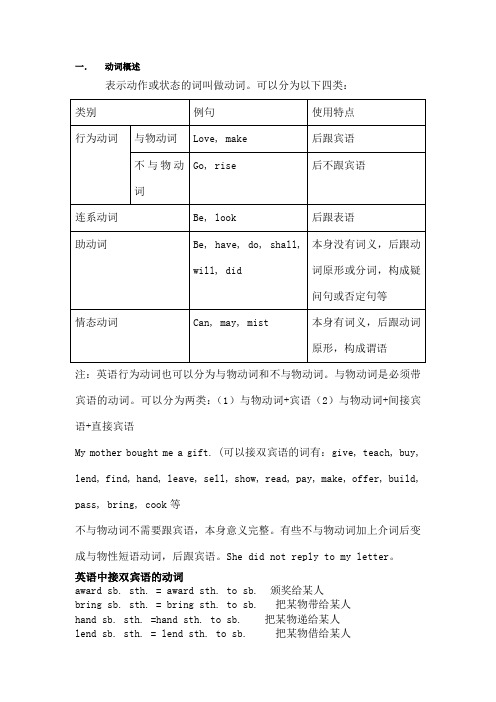
一.动词概述表示动作或状态的词叫做动词。
可以分为以下四类:注:英语行为动词也可以分为与物动词和不与物动词。
与物动词是必须带宾语的动词。
可以分为两类:(1)与物动词+宾语(2)与物动词+间接宾语+直接宾语My mother bought me a gift. (可以接双宾语的词有:give, teach, buy, lend, find, hand, leave, sell, show, read, pay, make, offer, build, pass, bring, cook等不与物动词不需要跟宾语,本身意义完整。
有些不与物动词加上介词后变成与物性短语动词,后跟宾语。
She did not reply to my letter。
英语中接双宾语的动词award sb. sth. = award sth. to sb. 颁奖给某人bring sb. sth. = bring sth. to sb. 把某物带给某人hand sb. sth. =hand sth. to sb. 把某物递给某人lend sb. sth. = lend sth. to sb. 把某物借给某人mail sb. sth. = mail sth. to sb. 把某物寄给某人offer sb. sth. = offer sth. to sb. 将某物给某人owe sb. sth. = owe sth. to sb. 欠某人某物pass sb. sth. = pass sth. to sb. 把某物递给某人pay sb. sth. = pay sth. to sb. 付给某人某物(钱)post sb. sth. = post sth. to sb. 把某物寄给某人read sb. sth. = read sth. to sb. 把某物读给某人听return sb.sth. = return sth. to sb. 把某物还给某人send sb. sth. = send sth. to sb. 把某物送给某人sell sb. sth. = sell sth. to sb. 把某物卖给某人serve sb. sth. = serve sth. to sb. 拿某物招待某人show sb. sth. = show sth. to sb. 拿某物给某人看take sb. sth. = take sth. to sb. 把某物拿给某人teach sb. sth. = teach sth. to sb. 教某人某物tell sb. sth. = tell sth. to sb. 告诉某人某情况throw sb. sth. = throw sth. to sb. 把某物扔给某人write sb. sth. = write sth. to sb. 给某人写信2、双宾语易位时需借助介词for的常用动词book sb. sth. = book sth. for sb. 为某人预定某物buy sb. sth. = buy sth. for sb. 为某人买某物choose sb. sth. = choose sth. for sb. 为某人选某物cook sb. sth. = cook sth. for sb. 为某人煮某物draw sb. sth. = draw sth. for sb. 为某人画某物fetch sb. sth. = fetch sth. for sb. 为某人去取某物find sb. sth. = find sth. for sb. 为某人找到某物fix sb. sth. = fix sth. for sb. 为某人准备某物get sb. sth. = get sth. for sb. 为某人拿来某物make sb. sth. = make sth. for sb. 为某人做某物order sb. sth. = order sth. for sb. 为某人订购某物pick sb. sth. = pick sth. for sb. 为某人采摘某物prepare sb. sth. = prepare sth. for sb. 为某人准备某物save sb. sth. = save sth. for sb. 为某人留某物sing sb. sth. = sing sth. for sb. 为某人唱某物(歌)spare sb. sth. = spare sth. for sb. 为某人让出某物steal sb. sth. = steal sth. for sb. 为某人偷某物3、有的动词后接的双宾语易位时,既可用介词to引出间接宾语,也可用介词for引出间接宾语,含义相同。
高中英语动词大全讲解
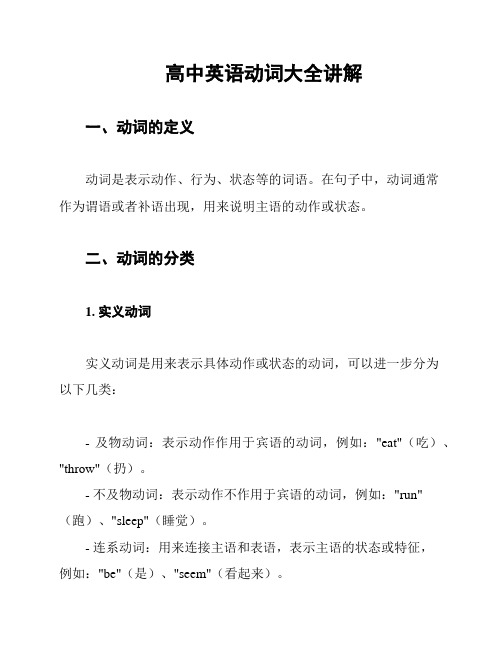
高中英语动词大全讲解一、动词的定义动词是表示动作、行为、状态等的词语。
在句子中,动词通常作为谓语或者补语出现,用来说明主语的动作或状态。
二、动词的分类1. 实义动词实义动词是用来表示具体动作或状态的动词,可以进一步分为以下几类:- 及物动词:表示动作作用于宾语的动词,例如:"eat"(吃)、"throw"(扔)。
- 不及物动词:表示动作不作用于宾语的动词,例如:"run"(跑)、"sleep"(睡觉)。
- 连系动词:用来连接主语和表语,表示主语的状态或特征,例如:"be"(是)、"seem"(看起来)。
2. 系动词3. 助动词助动词主要用于构成各种时态、语态和情态,不能单独作谓语,必须与其他动词连用。
常见的助动词有:"do"(做)、"have"(有)、"will"(将要)等。
4. 情态动词情态动词表示说话人对某种动作或状态的态度、意愿、推测等,常用的情态动词有:"can"(能够)、"may"(可能)、"must"(必须)等。
三、动词的形态变化动词在不同的时态、人称和数上会发生形态的变化,主要有以下几种形式:- 基本形:动词最原始的形态,通常是不带任何词尾的形式。
- 第三人称单数形:在第三人称单数主语下,动词通常在后面加上"–s"或"–es"。
- 过去式:表示过去的动作或状态,动词会根据不同规则变化。
四、动词的用法1. 谓语动词谓语动词是句子的核心,用来说明主语的动作或状态,通常位于句子的谓语部分。
2. 补语动词补语动词是用来补充说明主语的状态、特征等,位于句子的表语部分。
3. 不定式动词不定式动词是动词的非谓语形式,可以用来表示目的、动作的结果、原因等。
张道真高中英语语法之10系动词与助动词

----纸介图书双击此处跟踪天猫旗舰店·京东有售She speaks good English, doesn't she? 她英语讲得很好,对吗?[祈使句 ]Do be quiet!安静点!(2)用于替代和强调。
如:I don't like sports and neither does my brother. (does=My brother doesn't like sports.)我不喜欢体育运动,我弟弟也不喜欢。
— Your father promised you a bike. 你父亲容许给你买一辆自行车。
— So he did. (did=He promised me a bike.)他是容许过。
I do think you are right.我确实认为你是对的。
4. shall 和 will助动词 shall 和 will 本身没有词义,在一般将来时中,shall 和 will 之后都接动词原形。
shall 用于第一人称的将来时态;will 用于第二、三人称的将来时态,第一人称也可用will 。
如:I shall think it over.我要好好考虑一下。
He will be sixteen years old next month.他下个月将是16 岁。
You will have an English examination tomorrow.你们明天有英语考试。
5.should 和 would(1)should 无词义,是 shall 的过去式,与动词原形构成过去将来时,只用于第一人称。
如:I telephoned him yesterday to ask what I should do next week.我昨天给他打,问他下周我干什么?(2) would 无词义,是 will 的过去式,与动词原形构成过去将来时,用于第二、三人称。
如:Jim said he would come.吉姆说他要来。
高中英语动词用法分类

高中英语动词用法分类在高中英语的学习中,动词无疑是最为重要的语法点之一。
动词的用法多样且复杂,准确掌握动词的用法对于理解和运用英语至关重要。
下面我们就来对高中英语动词的用法进行分类讲解。
一、实义动词实义动词是表示具体动作或状态的动词,又可分为及物动词和不及物动词。
及物动词后面必须跟宾语,才能表达完整的意思。
例如,“I love English”(我爱英语)中的“love”就是及物动词,“English”是它的宾语。
常见的及物动词有“eat”(吃)、“read”(读)、“write”(写)等。
不及物动词本身意义完整,后面不需要跟宾语。
例如,“The bird flies”(鸟儿飞翔)中的“flies”就是不及物动词。
常见的不及物动词有“come”(来)、“go”(去)、“swim”(游泳)等。
有些动词既可以作及物动词,又可以作不及物动词,其意义会有所不同。
比如,“run”作不及物动词时表示“跑”,如“He runs fast”(他跑得很快);作及物动词时表示“经营,管理”,如“He runs a company”(他经营一家公司)。
二、系动词系动词用于连接主语和表语,表示主语的身份、性质、状态等。
常见的系动词有 be(am/is/are/was/were)、seem(似乎)、look(看起来)、feel(感觉)、sound(听起来)、taste(尝起来)、smell(闻起来)等。
例如,“She is beautiful”(她很漂亮),“The soup tastes delicious”(这汤尝起来很美味)。
三、助动词助动词本身没有实际意义,主要用于帮助构成各种时态、语态、语气等。
常见的助动词有 do/does/did、have/has/had、be(am/is/are/was/were)、will/shall 等。
比如,在一般现在时中,当主语是第三人称单数时,我们用“does”来构成否定句和疑问句,如“He doesn't like sports”(他不喜欢运动),“Does she come from China?”(她来自中国吗?)四、情态动词情态动词表示说话人的语气、态度或推测等。
系动词的用法种类及练习题和讲解

一"be":is am are四"变":get become turn go五"感官":feel taste smell sound look系动词系动词亦称联系动词(Link Verb),作为系动词,它本身有词义,但不能单独用作谓语,后边必须跟表语(亦称补语),构成系表结构说明主语的状况、性质、特征等情况。
说明:有些系动词又是实义动词,该动词表达实义时,有词义,可单独作谓语,例如:He fell ill yesterday.他昨天病了。
(fell是系动词,后跟补足语,说明主语情况。
)He fell off the ladder.他从梯子上摔下来。
fell是实义动词,单独作谓语。
1)状态系动词用来表示主语状态,只有be一词,例如:He is a teacher. 他是一名教师。
(is与补足语一起说明主语的身份。
)2)持续系动词用来表示主语继续或保持一种状况或态度,主要有keep, rest, remain, stay, lie, stand, 例如:He always kept silent at meeting. 他开会时总保持沉默。
This matter rests a mystery. 此事仍是一个谜。
3)表像系动词用来表示"看起来像"这一概念,主要有seem, appear, look, 例如:He looks tired. 他看起来很累。
He seems (to be) very sad. 他看起来很伤心。
4)感官系动词感官系动词主要有feel, smell, sound, taste, 例如:This kind of cloth feels very soft.这种布手感很软。
This flower smells very sweet.这朵花闻起来很香。
5)变化系动词这些系动词表示主语变成什么样,变化系动词主要有become, grow, turn, fall, get, go, come, run.例如:He became mad after that. 自那之后,他疯了。
高中英语语法词法知识讲解助动词
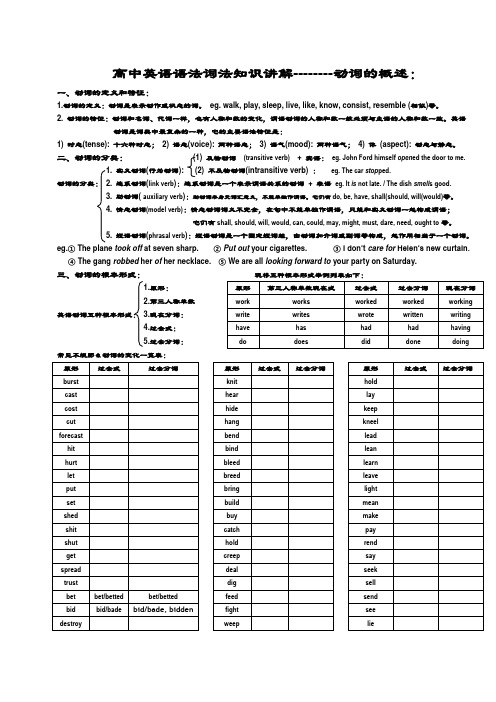
高中英语语法词法知识讲解--------动词的概述:一、动词的定义和特征:1.动词的定义:动词是表示动作或状态的词。
eg. walk, play, sleep, live, like, know, consist, resemble (相似)等。
2. 动词的特征:动词和名词、代词一样,也有人称和数的变化,谓语动词的人称和数一般必须与主语的人称和数一致。
英语动词是词类中最复杂的一种,它的主要语法特征是:1) 时态(tense): 十六种时态;2) 语态(voice): 两种语态;3) 语气(mood): 两种语气;4) 体(aspect): 动态与静态。
二、动词的分类:(1) 及物动词(transitive verb)+ 宾语:eg. John Ford himself open ed the door to me.1. 实义动词(行为动词): (2) 不及物动词(intransitive verb) :eg. The car stop ped.动词的分类: 2. 连系动词(link verb):连系动词是一个表示谓语关系的动词+ 表语eg. It is not late. / The dish smell s good.3. 助动词( auxiliary verb):助动词本身无词汇意义,不能单独作谓语。
它们有do, be, have, shall(should, will(would)等。
4. 情态动词(model verb):情态动词词义不完全,在句中不能单独作谓语,只能和实义动词一起构成谓语;它们有shall, should, will, would, can, could, may, might, must, dare, need, ought to等。
5. 短语动词(phrasal verb):短语动词是一个固定短词组,由动词加介词或副词等构成,起作用相当于一个动词。
eg.① The plane took off at seven sharp. ②Put out your cigarettes. ③I don’t care for Helen’s new curtain.④ The gang robbed her of her necklace. ⑤ We are all looking forward to your party on Saturday.三、动词的根本形式:现将五种根本形式举例列表如下:1.原形:2.第三人称单数英语动词五种根本形式: 3.现在分词:4.过去式:5.过去分词:常见不规那么动词的变化一览表:高中英语语法词法知识讲解--------助动词一.概念: 什么是助动词?助动词是帮助主要动词构成各种时态,语态,语气以及否认或疑问结构的动词, 助动词分为时态助 动词和结构助动词两种。
(完整版)高中英语系动词和助动词精讲及练习
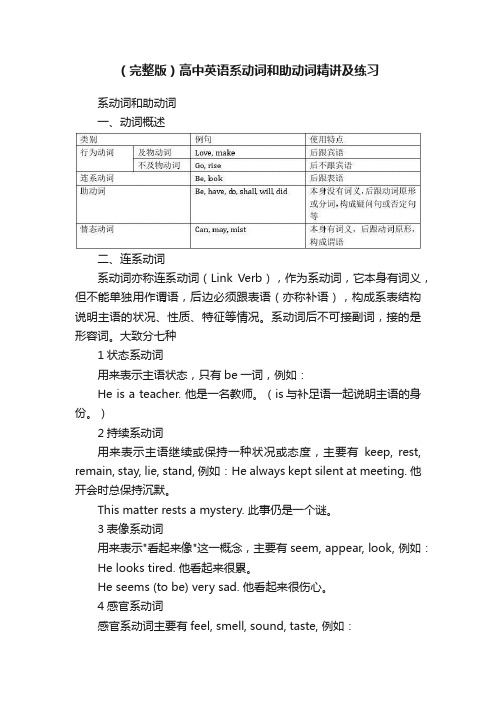
新兴县三小2018-2019学年一年级下学期数学3月月考试卷班级__________ 座号_____ 姓名__________ 分数__________一、选择题1.(2分)食堂运来80吨煤,10天共用去40吨,还剩多少吨?正确列式是()A.80-10B.80+10C.80+40D.80-402.(2分)个位上是7的两位数一共有()个。
A. 10B. 9C. 13.(2分)一本作业本4元,用一张5元买一本作业本应该找回()。
A.5角B.2元C.10角4.(2分)小军要买一本书,需要5元8角,他只有5元钱,还差()钱。
A. 5元3角B. 10元8角C. 8角5.(2分)()钱最多。
A.4张2元B.1张10元C.3张5元6.(2分)共有()个。
A. 24B. 34C. 44二、判断题7.(2分)最小的六位数是100000。
8.(2分)小华买一辆模型车用了23元,买一架玩具飞机29元,买一架玩具飞机比买一辆模型车用的钱多一些。
9.(2分)100比15多一些。
()10.(2分)□7<72分方框中只能填6。
11.(2分)在百数表中,个位上的数字和十位上的数字相同的数有10个。
三、填空题12.(5分)请你按得数把苹果里的算式排一排。
________>________>________>________>________13.(4分)写出十位上比个位上数字多3的两位数:41,________,________,________,________。
14.(10分)解决问题。
(1)买一件上衣和一条短裙要多少钱?(2)付给售货员100元,应找回多少钱?15.(5分)数出下面图形的个数。
________16.(3分)89里面有________个十和________个一;50再加上________就和56同样多。
17.(6分)人民币的单位有________、________、________。
以有为单位的人民币的面值有________角、________角、________角。
第二轮高考语法复习讲练一(系动词、助动词)

第二轮高考语法复习讲练一(系动词、助动词)系动词概念:本身有一定的词义,但不能独立作谓语,必须与表语(由形容词、介词、分词等充当)一起构成复合谓语。
从词汇意义上讲,系动词可分三类。
1.状态类系动词表示具有某性质、特征或处于某种状态。
一般来说,凡表示状态的系动词都是静态的,不能用进行体。
这类系动词有be, appear, seem, feel, sound, look, smell, taste1)You tried it on and it______________________________(穿在你身上太好看了).2)The other idea____________________________(我听起来更好).3)Most of us would probably__________________(感到非常悲伤)and give up ourdreams and hopes for the future.4)Creating a new festival may_____________________(似乎是一种非同寻常的方法)to celebrate history and culture, but we are in fact all creating new festivals every year.5)The only limit to the fun is the imagination of the designers of the thrill rides---and it___________________(似乎是永无止境).6) When there’s a cookie in the kitchen she has to climb up the table, and when she gets to the cookie it will______________(味道好).7)I _________________(感到羞愧)as I fell farther and farther behind.2.渐变类动词:表示所叙述的动作或产生的结果,或者表示状态的变化。
高中英语助动词精讲精练

高中英语助动词精讲精练助动词顾名思义是用来协助动词,大致分为一般助动词及情态助动词。
助动词后面一定要用原形动词,而且两个助动词不可以一起使用。
I. 一般助动词有be、do、have等三类,协助句子中主要动词形成否定句、疑问句,并帮助动词作简答。
※Don’t置于句首构成否定祈使句。
Don’t tell a lie.Don’t be so foolish!Don’t you tell a lie. →更为不客气。
[EXERCISE]1.I am looking for a job. → (疑) ___________________________________________(否) __________________________________________ 2. 2. May wants to study abroad.→ (疑) _____________________________________(否) _____________________________________ II.情态助动词包括can、could、may、might、must、shall、should、will、would原形过去式中文原形过去式中文shall should 应该must had to 必须will would 将会had better 无最好can could 能够would rather 无宁愿may might 可能ought to 无应该should / shall Examplesshould表示「应该」,等于ought to。
should not缩写为shouldn’t。
在美国,除了第一人称的礼貌问句(表请示之意) 外,很少使用shall。
I should go home now.We shouldn’t stay up too late.Shall we go now?Shall I call a doctor for you?※Shall we V…? = Let’s C…, shall we?I don’t eat pizza.Did John eat a lot this morning?Do you and your brother play baseball after school every day? A: Does Keith ride a bike to school every day?B: Yes, he does. / No, he doesn’t.Shall we go to see a movie now? (我们现在去看电影好吗?)=_______________________________________________________________________ =_______________________________________________________________________※It’s a. that S. (should) V…(人)….是…表强烈建议、要求、渴望It’s essential that Michael register this course in this semester.※语气和缓度:had better < ought to < should孩子不应该在靠马路那么近的地方玩耍。
张道真高中英语语法之10系动词与助动词

X道真高中英语语法之系动词与助动词担纲指导X道真执行主编席玉虎XX出版传媒集团XX教育2021年 6月第 2版2021年 2第 6次印刷出版人出版筹划责任编辑雷俊林苗补坤孙晓芳LSBN 978-7-5440-6435-4学习探讨请加微平台bbzdzyyyf语法学习交流微平台纸介图书京东旗舰店纸介图书天猫旗舰店百度阅读手持媒体免费读丨学英语,凭什么让我学语法吗???不时听到一些青年问道:学英语一定要学语法吗?语法应该怎么学呢?我们就这两个问题简单地谈一点个人意见。
对中国学生来说,尤其是成年人,我看是学点语法好。
语法,顾名思义,乃是语言的法那么和规律。
学习语法,尤其是一些根本法那么,至少有以下几个好处:第一可以使你学得快些,因为已有现成的前人总结的法那么,用不着你从头摸索。
第二可以使你学得透些,因为通过语法对语言现象不仅可以知其然,而且可以知其所以然。
第三可以使你学得准些,因为语法法那么就是一条条准绳,可以用以衡量一句话是否正确。
第四语法不但可以引你入门,更可以引你入胜,使你逐渐眼界开阔,语感加深,从而使你的英语水平不断提高。
丨那么应该如何学习语法呢?我认为在学习语法过程中,应该注意下面几点:第一根本概念最重要。
在学习每个语法工程时,一定要把它的根本概念搞清,牢记在心。
第二要大量地实践,大量地练习。
实践要包括听、说、读、写四个方面,练习要着重说和写。
第三学习语法时,应多用比较法。
如对动词时态、冠词、介词、名词的单、复数等较难的语法工程进展相互比较,效果就比较好。
第四要将语法法那么与习惯用法分开。
碰到习惯用法,就不必钻牛角尖,进展徒劳的分析。
而习惯用法在英语中那么是大量地存在着的。
第五将一本语法书通读一遍,当然也不无好处。
但最好将它作为工具书,像词典一样地经常查阅,始能学得比较细致牢靠。
第六实用英语语法只应是入门的向导,像一根拐棍一样。
英语到达一定水平之后,就应将它扔掉。
起码不要让许多语法条条充满头脑,影响你说和写的流利性。
2025中职高考英语动词精讲精练

连系动词 • 连系动词本身有词义,但不能单独作谓语,必须和表语一起构成谓语。 • 1.最常用的连系动词是 be。如: • We are in her room.我们在她的房间里。 • 2.英语的连系动词除be外,还有部分实义动词也可充当连系动词,常见的
有以下两类。(1)表示状态:look,appear,seem,feel,remain,keep, continue, prove, sound, smell,taste 等。如: • Smoking is bad for us to keep healthy.吸烟对我们保持健康来说是有害的。 • His theory sounded reasonable.他的理论听起来合情合理。
• A: Do you want any dessert?
• B: No dessert. Just coffee.
• A: Anything else? • B:No, ( thanks
礼貌用语回答
).
情景交际对话
• Waiter: Good evening and welcome ( to
)our restaurant.
部分动词的用法比较
• 5. take, spend,cost和pay • 四个词都有“花费”的意思,但要注意它们的用法及介词搭配。 • (1)It takes sb.time to do sth.某人花费时间做某事。如: • It took me two hours to do my homework.做作业花了我两个小时。 • (2)sb.spend time/money doing/on sth.某人花费时间或金钱做某事/在……上花费时间
• 1.动词+介词
动词短语的分类
• 常见的有 look for,look after,ask for,laugh at,hear of等,这类动词短语的宾语只 能放在介词后面。如:
- 1、下载文档前请自行甄别文档内容的完整性,平台不提供额外的编辑、内容补充、找答案等附加服务。
- 2、"仅部分预览"的文档,不可在线预览部分如存在完整性等问题,可反馈申请退款(可完整预览的文档不适用该条件!)。
- 3、如文档侵犯您的权益,请联系客服反馈,我们会尽快为您处理(人工客服工作时间:9:00-18:30)。
系动词和助动词一、动词概述二、连系动词系动词亦称连系动词(Link Verb),作为系动词,它本身有词义,但不能单独用作谓语,后边必须跟表语(亦称补语),构成系表结构说明主语的状况、性质、特征等情况。
系动词后不可接副词,接的是形容词。
大致分七种1状态系动词用来表示主语状态,只有be一词,例如:He is a teacher. 他是一名教师。
(is与补足语一起说明主语的身份。
)2持续系动词用来表示主语继续或保持一种状况或态度,主要有keep, rest, remain, stay, lie, stand, 例如:He always kept silent at meeting. 他开会时总保持沉默。
This matter rests a mystery. 此事仍是一个谜。
3表像系动词用来表示"看起来像"这一概念,主要有seem, appear, look, 例如:He looks tired. 他看起来很累。
He seems (to be) very sad. 他看起来很伤心。
4感官系动词感官系动词主要有feel, smell, sound, taste, 例如:This kind of cloth feels very soft.这种布手感很软。
This flower smells very sweet.这朵花闻起来很香。
5变化系动词这些系动词表示主语变成什么样,变化系动词主要有become, grow, turn, fall(asleep), get, go, come, run.例如:He became mad after that. 自那之后,他疯了。
She grew rich within a short time. 她没多长时间就富了。
6终止系动词表示主语已终止动作,主要有prove, turn out, 表达"证实","变成"之意,例如:The rumor proved false. 这谣言证实有假。
The search proved difficult. 搜查证实很难。
His plan turned out a success. 他的计划终于成功了。
(turn out表终止性结果)7.使役动词:let,have,make 使,让…Let /make somebody do sthThe teacher lets/makes them clean the classroom after school.Make sb/sth adj.The story makes me happy. The color makes it look beautiful.Have somebody do sth 让某人做某事Have sth done 让某物被My mother haves me make the bed. I have my hair cut/washed.有些动词它们既可以用作实义动词,又可以用作连系动词。
另外be还可用作助动词。
它们的用法不同,词义和句型结构也有所不同。
例如:Look at the blackboard, please.请看黑板。
(look用作实义动词)He looks a little tired.他略显疲倦。
(look用作连系动词)They are at work.他们在工作。
(are用作连系动词)They are working.他们正在工作。
(are用作助动词,帮助构成现在进行时)三、助动词独使用,它没有对应的汉译,例如:He doesn't like English. 他不喜欢英语。
(doesn't是助动词,无词义;like是主要动词,有词义)1、助动词be(am, is, are, was, were, being, been)的用法(1)be后跟现在分词构成进行时态。
Who is playing the violin?谁在拉小提琴?She was reading a book then.那时她正在读书。
(2)be后跟过去分词构成被动语态。
He was asked to d o the work.有人要他干这件工作。
You are invited to attend the meetintg.有人邀请你参加会议。
(3)be 后跟不定式作谓语,有如下几种情况:①表示计划、安排将要发生的事。
Who are we to meet?我们要见谁呀?I'm to have supper with John this afternoon.今天下午我要与约翰一起吃晚饭。
②表示指示、命令,否定式表禁止。
You are to see the headmaster today.今天你必须去见校长。
You are not to enter the room without permission.未经允许你不能进入房间。
③表示义务、责任等,同should。
You are to be back before 5.你得在5点钟以前回来。
What is to be d one?该干什么。
④表示可能性,与情态动词may, can同义。
Such books are to be found in any library.这种书任何图书馆都有。
Not a sound was to be heard.一点声响也没有。
⑤表示后来发生的事,可以用来表示命运或注定They say good-bye, little knowing that they were never to meet again.他们告别了,没想到再也不能相见了。
He was to regret the decision.他有一天会后悔做出这一决定的。
⑥用于习语Where am I to go? 我该向何处去?What am I to do? 我该怎么办?2、助动词have(has, had, having)的用法(1)助动词have可以构成完成时或完成进行时He has been a d octor for 10 years.他当医生十年了。
This is the place I have been longing to visit.这就是我一直渴望参观的地方。
(2)和不定式构成谓语,表示客观上不得不做的事情。
We've missed the train. We'll have to wait for another one.我们己经误了火车,我们只能等下一列。
-Do we have to start work?我们得立刻工作吗?-No. We d on't have to.不,不必了。
3、do(d oes, did) 的用法(1)构成疑问句或否定句How did you know about it?你是怎样知道这件事的。
He does not smoke. 他不抽烟。
(2)加强语气。
He did tell that.他的确告诉了此事。
Do come and see us.一定来看我们。
(3)代替前面刚出现的动词,避免重复。
-You like popular music, d on't you?你喜欢流行音乐,是吧?-Yes , I d o.是的,我喜欢。
He speaks French as fluently as she does.他讲法语和她讲的一样流利。
(4)用于倒装句中。
Never did he pay attention to my words.他从不注意我的话。
Only then did I understand the importance of English.只是那时,我才了解到英语的重要性。
(5)构成否定的祈使句。
Don't be so careless.不要那么粗心。
Do not hesitate to come for help.只管来求助。
4. 助动词shall和will的用法shall和will作为助动词可以与动词原形一起构成一般将来时,例如:I shall study harder at English.我将更加努力地学习英语。
He will go to Shanghai.他要去上海。
说明:在过去的语法中,语法学家说shall用于第一人称,will 只用于第二、第三人称。
现在,尤其是在口语中,will常用于第一人称,但shall只用于第一人称,如用于第二、第三人称,就失去助动词的意义,已变为情态动词,试比较: He shall come.他必须来。
(shall有命令的意味。
)He will come.他要来。
(will只与动词原形构成一般将来时。
)shall在疑问句中,用于第一,第三人称,征求对方意愿shall I turn on the light?要开灯吗?( 我把灯打开好吗?)shall he come to see you?他要不要来看你(比较: will he come to see you? 他会不会来看你)shall 用在陈述句, 与第二第三人称连用, 变为情态动词表示允诺,命令,警告,和说话人的决心等5.助动词should,would的用法1)should无词义,只是shall的过去形式,与动词原形构成过去将来时,只用于第一人称,例如:I telephoned him yesterday to ask what I should do next week.我昨天给他打电话,问他我下周干什么。
比较:"What shall I do next week?"I asked."我下周干什么?"我问道。
(可以说,shall变成直接引语时,变成了should。
)2)would也无词义,是will的过去形式,与动词原形构成过去将来时,用于第二、第三人称,例如:He said he would come.他说他要来。
比较:"I will go," he said. 他说:"我要去那儿。
"1. —What is Mr Wang like?—____.A. He is a teacherB. He is old and kindC. He looks like a balloonD. He likes English2. What Mr White said sounds____.A. friendlyB. wonderfullyC. pleasantlyD. nicely3. The poor boy ____ blind at the age of three.A. turnedB. goesC. becameD. went4. When he was a child he____ .A. grew patienceB. was aliveC. ran wildD. came true5. His voice____ as if he has a cold.A. soundsB. listensC. hearsD. seems6. This shirt___ as if it is made of cotton.A. isB. looksC. feelsD. seems7. He looks ___ he hadn’t had a good meal for a monthA. thatB. as ifC. whenD. so far8. It ____that he was late for the train.A. looksB. turnsC. getsD. seems9. These apples taste_____.A. to he goodB. to be wellC. wellD. good10. —Do you like the shirt?—Yes, it ____ very soft.A. feelsB. feltC. is feelingD. is felt11. The moment Mr Zhang went to bed, he____ asleepA. keptB. gotC. fellD. fall12. When I went home yesterday, it was ____ dark.A. goingB. gettingC. runningD. coming13. Their plan ____ to be a perfect one.A. provedB. was provedC. is provingD. proving14. The flowers in the garden ____ sweet.A. soundB. tasteC. becomeD. smell15. She____ like her mother in character.A. looksB. seemsC. isD. feels16. It____ another fine day tomorrow.A. seemsB. promisesC. appearsD. looks17. He ____ much younger than he really is.A. appearsB. growsC. becomesD. turns18. You____ very pale. Do you feel sick?A. lookedB. lookC. lookingD. are looked19. His wish to become a driver has ____true.A. turnedB. realizedC. comeD. grown20. Her father ____a writer.A. turnedB. grewC. has turnedD. has become助动词专项训练1.If it is fine tomorrow, we ______ a football match.a. haveb. will havec. hasd. shall has2.When he was at school, he ______ early and take a walk before breakfast.a. will riseb. shall risec. should rised.would rise3.In the past 30 years China ______ great advances in the socialist revolution and socialist construction.a. has madeb. have madec. had maded. having made4.I ______ go to bed until I ______ finished my work.a. don’t/hadb. didn’t/havec. didn’t/hadd. don’t/have5.______ you think he ______ back by dinner time?a. Do/have comeb. Did/will have comec. Does/will comed. Do/will have come6.He said that he dropped his bag when he ______ for the bus.a. was runingb. was runningc. were runningd. is running7.No sooner ______ he arrived home than he ______ to start on another journey.a. has/was askedb. have/were askedc. had/is askedd. had/was asked8.“______ you give me a room for the night?” I asked on arriving at the hotel.a. Shouldb. Canc. Mightd. May9.There are nine of them, so ______ get into the car at the same time.a. they may not at allb. all they may notc. they can’t alld. all they can’t10.“We didn’t see him at the lecture yesterday.” “He ______ it.”a. mustn’t attendb. cannot have attendedc. would have not attendedd. needn’t have attended11.“You realize that you were driving at 100 mph, don’t you?”“No, officer. I ______. This car can’t do more than 80.”a. didn’t need to beb. may not have beenc. couldn’t have beend. needn’t have been12.he was a good runner so he ______ escape from the police.a. mightb. succeeded toc. wouldd. was able to13.If they ______, our plan will fall flat.a..are co-operatingb. had not co-operatedc. won’t co-operated. didn’t co-operate14.I hoped ______ my letter.a. her to answerb. that she would answerc. that she answersd. her answering15.He ______ live in the country than in the city.a. prefersb. likes toc. had betterd. would rather16.______ to see a film with us today?a. Did you likeb. Would you likec. Will you liked. Have you liked17.I’m sorry, bu t I had no alternative. I simply ______ what I did.a. must dob. had to doc. ought to have doned. have to do18.“Time is running out,______?”a. hadn’t we better got startb. hadn’t we better get startb. hadn’t we better get started d. ha dn’t we better not started19.No one ______ that to his face.a. dares sayb. dares sayingc. dare sayd. dare to say20.The students in the classroom ______ not to make so much noise.a. needb. oughtc. mustd. dare21.You ______ last week if you were really serious about your work.a. ought to comeb. ought to be comingc. ought have comed. ought to have come22.The elephants ought ______ hours ago by the keepers.a. to be fedb. to feedc. to being fedd. to have been fed23.“I wonder why they’re late.” “They ______ the train.”a. can have missedb. could missc. may have missedd. might miss24.“Tom graduated from college at a very young age.”“He ______ have been an outstanding student.”a. mustb. couldc. shouldd. might25.You ______ the examination again since you had already passed it.a. needn’t have takenb. didn’t need to takec. needn’t taked. mustn’t take26.He is really incompetent! The letter ______ yesterday.a. should be finished typingb. must be finished typingc. must have finished typingd. should have been finished typing27.The boy told his father that he would rather ______ an astronaut.a. becomeb. to becomec. becomingd. became28.When we reached the station, the train had still not arrived; so we ______.a. needed not to hurryb. needn’t have hurriedc.need not to have hurriedd. didn’t need to hurry29.Since your roommate is visiting her family this weekend,_____ you like to have dinner with us tonight?a. willb. won’tc. wouldn’td. do30.He was afraid what he had done ______ a disastrous effect on his career.a. might haveb. could bec. have beend. shall be31.He ______ hardly say anything more, since you know about it.a. don’t need tob. needn’tc. needsd. need32.You ______ the look on his face when he won the prize.a. would have seenb. should have seenc. must seed. can be seeing33.Some people think the stock market will crash, but ______.a. I wonder if it happensb. I doubt if it will happenc. I am afraid it wouldn’t happend. I doubt if it does happen34.“Whatever has happened to George?” “I don’t know. He ______ lost.”a. can have gotb. may have gotc. might getd. could get35.He has no idea what the book is about. He ______read the book.a. couldn’tb. couldn’t havec. mightn’t haved. shouldn’t have36.New studies show that two of Saturn’s rings ______ longer than the 4.5 billion years since the birth of the Solar System.a. could have lastedb. should have lastedc. would have lastedd. must be lasting37.Take the telescope with you in case you ______ it in your expedition.a. will needb. would needc. should needd. could need38.Need he come at once? Yes, he ______.a. mustb. must notc. needd. may39.Please answer the phone. It ______ be by your father. If it is, would you tell thatI want to see him?a. willb. shouldc. wouldd. could40.We’ll never give in whatever they ______ say or do.a. mayb. willc. shalld. should41.With all this work on hand, he ______ to the cinema last night.a. mustn’t gob. wouldn’t goc. oughtn’t god. shouldn’t have gone42.Everyone ______ the cake because there wasn’t even a small piece left.a. must likeb. must have likedc. must have been likingd. had liked43.I wish to recollect where I met her, ______?a. would Ib. may Ic. may not Id. can I44.I ______ think he will ______ dare the risk.a. not/ ..b. do/notc. ../notd. don’t/..45.If reading is to accomplish anything more than passing time, it ______ be active.a. may notb. mustc. mightd. is not46.You ______ your seats today if you want to go to the game.a. had better to reserveb. had better reservec. had to better reserved. had to reserve better47.I ______ the operation unless it is absolutely necessary.a. would rather not haveb. would not rather hadc. rather would not haved. rather not would have48.Many scientists ______ their own eyes and ears than the theories of the ancients.a. would rather to believeb. would rather believec. rather would believed. will rather believe49.To travel from England to Scotland you ______ a passport.a. haven’t gotb. mustn’t havec. needn’td. don’t need50.One of the statements ______ to be untrue.a. is turned outb. has turned outc. have been turned outd. have turned out51.I don’t know whether it will rain or not, but if it ______ rain, I shall stay at home.a. willb. didc. doesd. shall52.“You’d like some tea,______?”a. wouldn’t youb. shouldn’t youc. hadn’t youd. didn’t you53.“May we take the books out?”a. No, you may notb. No, you can notc. No, you can’td. Please don’t54.“I would have come sooner, but I ______ that you were waiting.”a. didn’t knowb. hasn’t knownc. hadn’t knowd. haven’t known55.If you don’t want to, you ______ to get there with us.a. mustn’tb. can’tc. don’t haved. have not56.I would go to visit them but I ______ think they are anxious to see me.a. haven’tb. don’tc. doesn’td. didn’t57.Whatever you can do,______.a. I can do so as wellb. I can do this as wellc.I can do it as welld. I can do as well58._____ I realized the consequences I would never have contemplated getting involved.a. Hadb. Havec. Havingd. Has59.“Perhaps she is working for John.” “Yes, she ______ for him.”a.need have been workingb. may be workingc.ought have been workingd. ought be working60.“I know she was in because I heard her radio, but she didn’t open the door.” “She ______ the bell.”a. may not be hearingb. may not have heardc.must not have heardd. must not be hearing61. “He was smoking.” “Then he ______ .”a.ought to have been not smokingb. ought to have not been smokingc.ought not to have been smokingd. ought to not have been smoking62.You ______ out yesterday without a coat. No wonder you caught cold.a. oughtn’t have goneb. shouldn’t have gonec. mustn’t have goned. can’t ha ve gone63.“Paul was riding a bicycle along the motorway when he was hit by the trailer of a lorry.”“He _____ a bicycle along the motorway; bicycles are not allowed.”a. shouldn’t have been ridingb. couldn’t have been ridingc.oughtn’t have been r idingd. can’t have been riding64.I am listening. But you ______.a. need be listeningb. should be listeningc. need have been listeningd. ought be listening65.He ______ with us last night.a.would have liked to gob. should like to be goingc.should be liked to god. would like to go66.I ______ his face when he opened the letter.a. should like you to seeb. would have liked you to be seenc.should like you to have seend. would like you to see67.You say you ______ do it, but I say you ______ do it.a. ought not/couldb. will not/shallc. could not/needd. shall not/ought68.We ______ put the meeting off for a week.a. can as wellb. will as wellc. shall as welld. may as well69.______ wind your watch every day?a. Do you needb. Must you have toc. Have you tod. Do you have to70.______ give him a chance to try?a. Oughtn’t to web. Oughtn’t we toc. Ought to we notd. Oughtn’t we71.“Did you blame him for his mistakes?” “______”a. I’d rather not dob. I’d not rather doc. I’d better not dod. I’d rather not doing72.You had better ______ your hair cut.a. hadb. havec. to getd. to have73.My sister didn’t go to the party last night because she ______ the baby for her friend until 9:30.a.must have looked afterb. would have to look afterc.had to look afterd. should have looked after74.Mary is very late, she ______.a.may miss her trainb. may have missed her trainc.must miss her traind. could miss her train75.No matter what you may say, he ______ to his own views.a.would always stickb. will always stickc. should always stickd. must always stick to76.It’s wonderful that you ______ have achieved so much in these years.a. mayb. canc. shouldd. would77.The students asked whether he ______ take the books out of the reading-room.a. couldb. mightc. shouldd. would78.He ______ still be thinking about the question you raised.a. mayb. mightc. mustd. should79.I’d be glad if you______ give me an account of the fact.a.shallb. shouldc. wouldd. may80.He ______ accomplish the task in time.a. didb. hasc. isd. do系动词练习答案与分析1. B What’s...like?是询问人或事物的性质特征情况的交际用语,答语中常含有说明性质特征情况的形容词。
